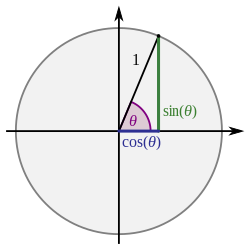
Back متسلسلة مثلثية Arabic ত্রিকোণমিতিক ধারা Bengali/Bangla Trigonometrijski red BS Sèrie trigonomètrica Catalan Тригонометрилле рет CV Serie trigonométrica Spanish Série trigonométrique French Тригонометриялық қатар Kazakh ស៊េរីត្រីកោណមាត្រ Cambodian 삼각급수 Korean
| Trigonometry |
|---|
 |
| Reference |
| Laws and theorems |
| Calculus |
| Mathematicians |
In mathematics, trigonometric series are a special class of orthogonal series of the form[1][2]
where is the variable and and are coefficients. It is an infinite version of a trigonometric polynomial.
A trigonometric series is called the Fourier series of the integrable function if the coefficients have the form:
- ^ Hardy & Rogosinski 1999, pp. 2, 4.
- ^ Zygmund 1968, pp. 6–7.






